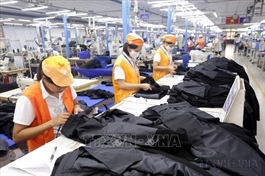Vietnam must prepare for data centre development trends
Vietnam must prepare for data centre development trends
According to statistics from the US Chamber of Commerce, there are 244 data centres in the United States, each with an average investment of $215 million. When a data centre is built, it can generate more than $240 million for the local economy and brings in an average revenue of over $30 million.

Hoang Viet Tien, deputy secretary general, Vietnam Digital Communication Association |
In addition to generating revenue, data centres also create a huge number of jobs, specifically when starting to build a data centre, it recruits an average of 1,700 related workers. Data centres also indirectly encourage environmental activities when major data centre operators in the world look towards using renewable energy.
An example of a developed country in the Southeast Asian region is Singapore. Data centres contribute $1.5 billion to GDP in Singapore, creating 2,500 direct jobs and 1.6 million indirect jobs, attracting a series of big tech investments in the country. Typically, Google increased its total capital in Singapore from $800 million to $5 billion in early June 2024 with the completion of the expansion of its latest data centre and cloud infrastructure.
Currently, Vietnam has a total of 28 data centre projects with a total capacity of 45MW, with the participation of 44 service providers. According to a 2023 Research and Markets report, the data centre market in Vietnam is expected to reach just over $1 billion in 2028 and more than $1.25 billion in 2030, with an average compound growth rate of 10.8 per cent per year.
The Vietnamese market has received positive attention from foreign corporations such as Alibaba, Australia Edge Centres Company, GAW Capital Investment Fund, NTT Group, Nvidia, and Google, among others. In the development of data centres, the influence and game-changing factor is now AI technology. With a growth rate of 36 per cent, generative AI applications span varied areas from customer care, e-commerce, after-sales service, to user experience.
DeepSeek, ChatGPT, and OpenAI are developing strongly every day, creating many important strategic events, not only for the technology industry but also relate to geopolitics. This is especially true when technology, especially AI, is seen as a strategic tool to shape the future of the world economy and politics.
After the explosion of AI and 5G, edge computing is also oft-mentioned because data is not only stored in data centres but also processed at the edge layer to reduce latency, reduce bandwidth costs, and increase scalability. Smart factories, self-driving cars, and banking are the sectors where edge computing develops.
In July 2024, Vietnam opened its data centre market to foreign investors. The Law on Telecommunications took effect, allowing full foreign investment in data centre services. It is predicted that cooperation deals between investors and data centre operators will take place, accelerating the expansion of Vietnam’s data centre market.
With this potential, many investors want to build data centre projects in Vietnam. Some notable projects include Gaw Capital’s 20MW data centre in Ho Chi Minh City’s High-Tech Park, Worldwide DC Solution’s 30MW project, and a collaboration between Japanese telecommunications giant NTT and DQ Tek.
Notably, Alibaba has announced plans to set up a data centre in Vietnam, reflecting the growing trend of global cloud service providers, especially from the US, increasing market competition and diversifying services.
Meanwhile, many other foreign investors are cooperating with Vietnamese technology companies with available data centre platforms to invest and guarantee output. Specifically, last May, ST Telemedia Global Data Centres, one of the fastest expanding data centre service providers worldwide, announced its cooperation with VNG to build and operate international standard data centre initiatives in Ho Chi Minh City.
In 2023, the government also issued a decree to regulate the protection of personal data and the responsibility to protect the personal data of relevant agencies, organisations, and individuals. This move aims to meet the requirements of protecting personal data rights, while preventing acts of personal data infringement.
According to Checkpoint’s research, 61 per cent of businesses experienced security incidents in 2023, a 2.5-fold increase from the previous year, causing direct losses of about $12.8 billion. These incidents also indirectly affect the world economy, causing losses of $9.5 trillion, meaning that every second the world loses $300,000 due to cyberattacks that disrupt supply chains and infrastructure.
Other trends affecting Vietnam in beyond in this area include deploying integrated multi-cloud and hybrid cloud, bringing many benefits to businesses; and mergers and acquisitions in data centres and the cloud. Currently, some foreign corporations want to speed up cooperation in Vietnam. Instead of setting up from scratch, they cooperate or contribute capital to domestic companies that have available licenses and infrastructure.
We can see the continuous development of tech and specifically the trend of data centres and AI. To create better conditions, the Vietnamese market needs to prepare a number of things. They include utilising policies and legal frameworks by issuing policies to support innovation in data and AI; and creating a safe legal environment for testing AI products without hindering innovation.
If Vietnam focuses on developing these areas and takes advantage of the opportunities from the global shift in technology, it can rise to become a leading data and AI centre in the Southeast Asian region. The key is the combination of the state’s strategic vision, resources from businesses, and the participation of young researchers and startups.
- 15:47 21/02/2025
























